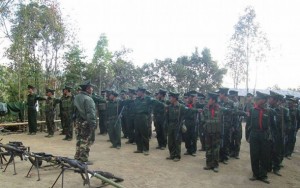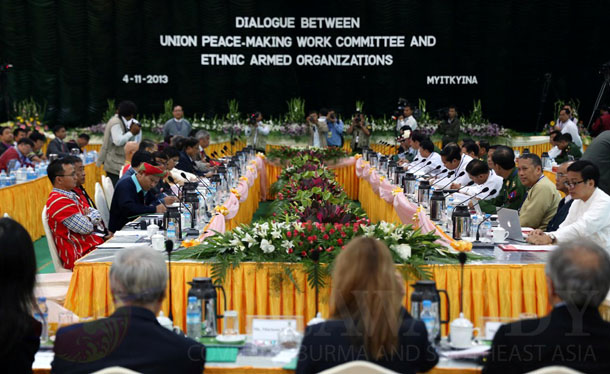Posts Tagged ‘Shan State Army-South’ (8 found)
More Clashes, More Talks, No Protection
 As talks over the signing of a nationwide ceasefire agreement (NCA) continue, with another meeting planned for later this month, the Burma Army continues to attack various ethnic armed organizations (EAOs) in Kachin, Palaung, Shan and Karen areas, casting doubt on the dominant narrative of optimism that surrounds the NCA. Meanwhile, as has always been the case, it is civilians and local communities who are bearing the brunt of the war, with their protection glaringly absent in the ceasefire discourse […]
As talks over the signing of a nationwide ceasefire agreement (NCA) continue, with another meeting planned for later this month, the Burma Army continues to attack various ethnic armed organizations (EAOs) in Kachin, Palaung, Shan and Karen areas, casting doubt on the dominant narrative of optimism that surrounds the NCA. Meanwhile, as has always been the case, it is civilians and local communities who are bearing the brunt of the war, with their protection glaringly absent in the ceasefire discourse […]
Special Representative of the Secretary-General for Children and Armed Conflict, Leila Zerrougui, Concludes Her First Visit to Myanmar
The United Nations Special Representative of the Secretary-General (SRSG) for children and armed conflict, Leila Zerrougui, concluded a five-day visit to Myanmar today. Her first visit to the country, at the invitation of the Government, aimed to assess the impact of the conflict on children in accordance with United Nations Security Council resolution 1612, focusing in particular on the implementation of the Joint Action Plan (JAP) signed in 2012 by the Government and the Country Task Force on Monitoring and Reporting (CTFMR) to end and prevent the recruitment and use of children by the armed forces of Myanmar (Tatmadaw). The SRSG visited Nay Pyi Taw, Yangon, Mandalay and Myitkyina (Kachin state) […]
• • •Elusive Nationwide Ceasefire Agreement Continues to Distract from Substantial Peace Talks
 As talks over the signing of a nationwide ceasefire agreement (NCA) are delayed once again, thus pushing substantive dialogue further into the future, Burma’s decades long civil war rages on in Kachin and Shan States.
As talks over the signing of a nationwide ceasefire agreement (NCA) are delayed once again, thus pushing substantive dialogue further into the future, Burma’s decades long civil war rages on in Kachin and Shan States.
Talks over the signing of the NCA have now gone on for nearly 18 months and the situation on the ground has still not changed. The Burma Army continues to attack ethnic armed groups in areas where ceasefires have been signed, such as those of the Shan State Army South and Shan State Army North, as well as continuing offensives against the Kachin Independence Army and the Ta’ang National Liberation Front (TNLA) where there is no ceasefire. On Monday 18 August, a civilian in Namkan Township, Shan State was shot dead and another hospitalized after a clash between the TNLA and Burma Army. Human rights violations such as sexual violence, arbitrary arrest, torture and extrajudicial killing continue in these active conflict areas, while in areas where individual ceasefires are holding, the Burma Army is entrenching its power both militarily and economically through land confiscation and reinforcement of its positions.
The aim in this pursuit of the NCA is questionable as it distracts from the real issues at hand that prevent the ethnic people of Burma from enjoying genuine peace. Let us not forget that the Burma government has already signed ceasefire agreements with most ethnic armed groups. But has this stopped the attacks and human rights violations inflicted on local communities by armed forces? This question cannot be answered in the affirmative. Just ask the villagers who live in Murng Hsu, Shan State, whose homes came under artillery attack, and were forced to act as guides for the Burma Army in June of this year in a supposed ceasefire area. If all groups sign on to the NCA, the biggest question is how can they trust that the Burma Army will actually cease its attacks. There is scant evidence of this from current and previous ceasefires […]
• • •Villagers Confined After Burma Army Shelling of Shan Ceasefire Group Near Thai Border
Ethnic Padaung villagers of Ho Ha, in Ho Mong township, southern Shan State, were confined in their village for three days after Burmese Army soldiers attacked the nearby base of a Shan ceasefire group earlier this week.
On October 26, 2013, about 30 Burmese troops from Light Infantry Battalion 287, led by Major Min Zaw Lin, fired 60 mm mortar shells at Tab Kawng Hsarng, a base of the Shan State Army-South (SSA-S) […]
• • •Burmese Government Troops Use Villagers as Human Shields After Attacks Against Ceasefire Group in Central Shan State
On October 13, 2013, Burmese government troops forced 18 villagers to walk between them as human shields while returning to their base, after attacking a Shan ceasefire group in Kunhing, close to the Salween River, in central Shan State.
About 80 Burmese troops from Light Infantry Battalion 150, based at Mong Zarng, 30 miles north of Kunhing, had attacked the Shan State Army-South during October 10 to 12, firing mortar shells and causing over 100 people from the village of Paeng Ner, southeast of Kunhing, to flee their homes […]
• • •Thein Sein and China Must Stop Pipeline Project to Prevent Escalation of Conflict in Northern Shan State
Shan community based groups warn that recent Burmese government army attacks in northern Shan State, causing displacement of over 3,000 villagers, are directly linked to China’s oil and gas pipelines, and urge Burmese President Thein Sein and China to stop the project immediately before violence escalates even further […]
• • •Shan Community Groups: Don’t Push Refugees Back into Active War Zone
Shan community groups are gravely concerned about imminent repatriation of over 500 refugees from a camp on the northern Thai border into an area of active conflict.
Today, the Norwegian Refugee Council, contracted under the Norwegian-led “Myanmar Peace Support Initiative,” will begin house-to-house surveys of refugees in Koung Jor camp, northern Chiang Mai province, about their willingness to return […]
• • •12-Point Agreement between the Restoration Council of Shan State / Shan State Army – South and the Government
Unofficial translation by SHAN.
• •








 All posts
All posts